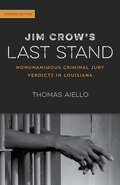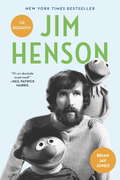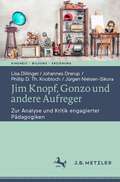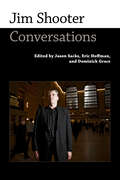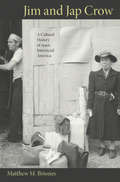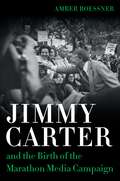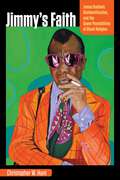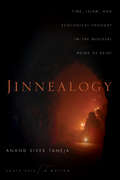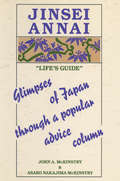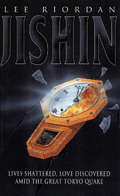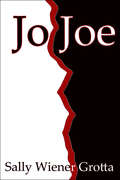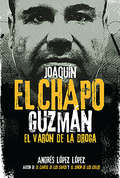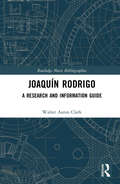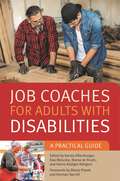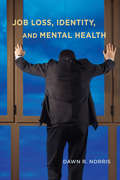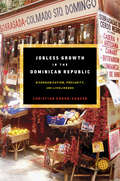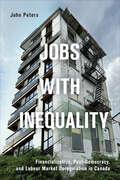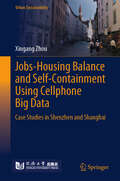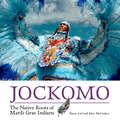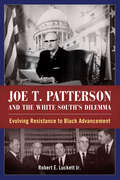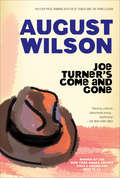- Table View
- List View
Jim Crow’s Last Stand: Nonunanimous Criminal Jury Verdicts in Louisiana
by Thomas AielloA remnant of the racist post-Reconstruction Redeemer sociopolitical agenda, Louisiana’s nonunanimous jury-verdict law permitted juries to convict criminal defendants with only nine, and later ten, out of twelve votes: a legal oddity. On the surface, it was meant to speed convictions. In practice, the law funneled many convicts—especially African Americans—into Louisiana’s burgeoning convict lease system. Although it faced multiple legal challenges through the years, the law endured well after convict leasing had ended. Few were aware of its existence, let alone its original purpose. In fact, the original publication of Jim Crow’s Last Stand was one of the first attempts to call attention to the historical injustice caused by this law. This updated edition of Jim Crow’s Last Stand unpacks the origins of the statute in Bourbon Louisiana, traces its survival through the civil rights era, and ends with the successful effort to overturn the nonunanimous jury practice, a policy that officially went into effect on January 1, 2019.
Jim Henson: The Biography
by Brian Jay JonesFor the first time ever--a comprehensive biography of one of the twentieth century's most innovative creative artists: the incomparable, irreplaceable Jim Henson He was a gentle dreamer whose genial bearded visage was recognized around the world, but most people got to know him only through the iconic characters born of his fertile imagination: Kermit the Frog, Bert and Ernie, Miss Piggy, Big Bird. The Muppets made Jim Henson a household name, but they were just part of his remarkable story. This extraordinary biography--written with the generous cooperation of the Henson family--covers the full arc of Henson's all-too-brief life: from his childhood in Leland, Mississippi, through the years of burgeoning fame in America, to the decade of international celebrity that preceded his untimely death at age fifty-three. Drawing on hundreds of hours of new interviews with Henson's family, friends, and closest collaborators, as well as unprecedented access to private family and company archives, Brian Jay Jones explores the creation of the Muppets, Henson's contributions to Sesame Street and Saturday Night Live, and his nearly ten-year campaign to bring The Muppet Show to television. Jones provides the imaginative context for Henson's non-Muppet projects, including the richly imagined worlds of The Dark Crystal and Labyrinth--as well as fascinating misfires like Henson's dream of opening an inflatable psychedelic nightclub. An uncommonly intimate portrait, Jim Henson captures all the facets of this American original: the master craftsman who revolutionized the presentation of puppets on television, the savvy businessman whose dealmaking prowess won him a reputation as "the new Walt Disney," and the creative team leader whose collaborative ethos earned him the undying loyalty of everyone who worked for him. Here also is insight into Henson's intensely private personal life: his Christian Science upbringing, his love of fast cars and expensive art, and his weakness for women. Though an optimist by nature, Henson was haunted by the notion that he would not have time to do all the things he wanted to do in life--a fear that his heartbreaking final hours would prove all too well founded. An up-close look at the charmed life of a legend, Jim Henson gives the full measure to a man whose joyful genius transcended age, language, geography, and culture--and continues to beguile audiences worldwide. Advance praise for Jim Henson "I'm a rabid Jim Henson fan--his brilliant ideas spawned shows that entertained and educated millions, myself included. Jim Henson vibrantly delves into the magnificent man and his Muppet methods. It's an absolute must read!"--Neil Patrick Harris "[Brian Jay Jones's] lucid style, wide-angle perspective, and deep immersion in Henson's exuberantly innovative approach to puppets, television, and film make for a thoroughly compelling read. . . . With verve and insight, Jones illuminates the full scope of Henson's genius, phenomenal productivity, complex private life, zeal to do good, and astronomical influence."--Booklist (starred review) "I worked with Jim for more than thirty years. He was one of my closest friends. And yet I found out things about him in Jim Henson that were new to me. Brian Jay Jones has captured the layers of Jim's genius and humanity, as well as the flaws that made Jim, like all of us, so delightfully imperfect. Jim needed this book to be written. I thank Brian for giving Jim life again. This book has captured the spirit of Jim Henson."--Frank Oz
Jim Knopf, Gonzo und andere Aufreger: Zur Analyse und Kritik engagierter Pädagogiken (Kindheit – Bildung – Erziehung. Philosophische Perspektiven)
by Johannes Drerup Jürgen Nielsen-Sikora Phillip D. Knobloch Lisa DillingerIn bildungspolitischen Diskussionen melden sich aktuell immer mehr Vertreter*innen politisch ambitionierter Pädagogiken zu Wort, die die pädagogische Nutzung ganz unterschiedlicher Kulturprodukte kritisieren, indem sie diese als Ausdruck von Rassismus, Sexismus, Kolonialismus oder Klassismus deuten. Bei solchen politisch und pädagogisch umkämpften Kulturprodukten handelt es sich beispielsweise um Kinderspielzeug, Dreadlocks oder Schokoladenverpackungen, um Kunstwerke, Fernsehserien, Gedichte und um Bücher. In dem Band werden diese engagierte Pädagogiken, die pädagogische und politische Vorgaben für den angemessenen und richtigen Umgang mit Kulturprodukten machen, anhand von Beispielen – vom Kinderbuch ‚Jim Knopf´ bis hin zu ‚Gonzo‘ aus der Muppetshow – aus der gebotenen Distanz analysiert und auf den Prüfstand gestellt.
Jim Shooter: Conversations (Conversations with Comic Artists Series)
by Jason Sacks, Eric Hoffman, and Dominick GraceAs an American comic book writer, editor, and businessman, Jim Shooter (b. 1951) remains among the most important figures in the history of the medium. Starting in 1966 at the age of fourteen, Shooter, as the young protégé of verbally abusive DC editor Mort Weisinger, helped introduce themes and character development more commonly associated with DC competitor Marvel Comics. Shooter created several characters for the Legion of Super-Heroes, introduced Superman’s villain the Parasite, and jointly devised the first race between the Flash and Superman. When he later ascended to editor-in-chief at Marvel Comics, the company, indeed the medium as a whole, was moribund. Yet by the time Shooter left the company a mere decade later, the industry had again achieved considerable commercial viability, with Marvel dominating the market. Shooter enjoyed many successes during his tenure, such as Chris Claremont and John Byrne’s run on the Uncanny X-Men, Byrne’s work on the Fantastic Four, Frank Miller’s Daredevil stories, Walt Simonson’s crafting of Norse mythology in Thor, and Roger Stern’s runs on Avengers and The Amazing Spider-Man, as well as his own successes writing Secret Wars and Secret Wars II. After a rift at Marvel, Shooter then helped lead Valiant Comics into one of the most iconic comic book companies of the 1990s, before moving to start-up companies Defiant and Broadway Comics. Included here is a 1969 interview that shows a restless teenager; the 1973 interview that returned Shooter to comics; a discussion from 1980 during his pinnacle at Marvel; and two conversations from his time at Valiant and Defiant Comics. At the close, an extensive, original interview encompasses Shooter’s full career.
Jim and Jap Crow: A Cultural History of 1940s Interracial America
by Matthew M. BrionesFollowing Japan's attack on Pearl Harbor in 1941, the U.S. government rounded up more than one hundred thousand Japanese Americans and sent them to internment camps. One of those internees was Charles Kikuchi. In thousands of diary pages, he documented his experiences in the camps, his resettlement in Chicago and drafting into the Army on the eve of Hiroshima and Nagasaki, and his postwar life as a social worker in New York City. Kikuchi's diaries bear witness to a watershed era in American race relations, and expose both the promise and the hypocrisy of American democracy. Jim and Jap Crow follows Kikuchi's personal odyssey among fellow Japanese American intellectuals, immigrant activists, Chicago School social scientists, everyday people on Chicago's South Side, and psychologically scarred veterans in the hospitals of New York. The book chronicles a remarkable moment in America's history in which interracial alliances challenged the limits of the elusive democratic ideal, and in which the nation was forced to choose between civil liberty and the fearful politics of racial hysteria. It was an era of world war and the atomic bomb, desegregation in the military but Jim and Jap Crow elsewhere in America, and a hopeful progressivism that gave way to Cold War paranoia. Jim and Jap Crow looks at Kikuchi's life and diaries as a lens through which to observe the possibilities, failures, and key conversations in a dynamic multiracial America.
Jimmy Carter and the Birth of the Marathon Media Campaign (Media and Public Affairs)
by Amber RoessnerWith the rise of Jimmy Carter, a former Georgia governor and a relative newcomer to national politics, the 1976 presidential election proved a transformative moment in U.S. history, heralding a change in terms of how candidates run for public office and how the news media cover their campaigns.Amber Roessner’s Jimmy Carter and the Birth of the Marathon Media Campaign chronicles a change in the negotiation of political image-craft and the role it played in Carter’s meteoric rise to the presidency. She contends that Carter’s underdog victory signaled a transition from an older form of party politics focused on issues and platforms to a newer brand of personality politics driven by the manufacture of a political image.Roessner offers a new perspective on the production and consumption of media images of the peanut farmer from Plains who became the thirty-ninth president of the United States. Carter’s miraculous win transpired in part because of carefully cultivated publicity and advertising strategies that informed his official political persona as it evolved throughout the Democratic primary and general-election campaigns. To understand how media relations helped shape the first post-Watergate presidential election, Roessner examines the practices and working conditions of the community of political reporters, public relations agents, and advertising specialists associated with the Carter bid. She draws on materials from campaign files and strategic memoranda; radio and TV advertisements; news and entertainment broadcasts; newspaper and magazine coverage; and recent interviews with Carter, prominent members of his campaign staff, and over a dozen journalists who reported on the 1976 election and his presidency.With its focus on the inner workings of the bicentennial election, Jimmy Carter and the Birth of the Marathon Media Campaign offers an incisive view of the transition from the yearlong to the permanent campaign, from New Deal progressivism to New Right conservatism, from issues to soundbites, and from objective news analysis to partisan commentary.
Jimmy's Faith: James Baldwin, Disidentification, and the Queer Possibilities of Black Religion
by Christopher HuntQSpirit Top 24 LGBTQ Christian Books of 2024A novel approach to understanding the work of James Baldwin and its transformative potentialThe relationship of James Baldwin’s life and work to Black religion is in many ways complex and confounding. What is he doing through his literary deployment of religious language and symbols?Despite Baldwin’s disavowal of Christianity in his youth, he continued to engage the symbols and theology of Christianity in works such as The Amen Corner, Just Above My Head, and others. With Jimmy’s Faith, author Christopher W. Hunt shows how Baldwin’s usage of those religious symbols both shifted their meaning and served as a way for him to build his own religious and spiritual vision. Engaging José Esteban Muñoz’s theory of disidentification as a queer practice of imagination and survival, Hunt demonstrates the ways in which James Baldwin disidentifies with and queers Black Christian language and theology throughout his literary corpus. Baldwin’s vision is one in which queer sexuality signifies the depth of love’s transforming possibilities, the arts serve as the (religious) medium of knitting Black community together, an agnostic and affective mysticism undermines Christian theological discourse, “androgyny” troubles the gender binary, and the Black child signifies the hope for a world made new. In disidentifying with Christian symbols, Jimmy’s Faith reveals how Baldwin imagines both religion and the world “otherwise,” offering a model of how we might do the same for our own communities and ourselves.
Jinnealogy: Time, Islam, and Ecological Thought in the Medieval Ruins of Delhi
by Anand Vivek TanejaIn the ruins of a medieval palace in Delhi, a unique phenomenon occurs: Indians of all castes and creeds meet to socialize and ask the spirits for help. The spirits they entreat are Islamic jinns, and they write out requests as if petitioning the state. At a time when a Hindu right wing government in India is committed to normalizing a view of the past that paints Muslims as oppressors, Anand Vivek Taneja's Jinnealogy provides a fresh vision of religion, identity, and sacrality that runs counter to state-sanctioned history. The ruin, Firoz Shah Kotla, is an unusually democratic religious space, characterized by freewheeling theological conversations, DIY rituals, and the sanctification of animals. Taneja observes the visitors, who come mainly from the Muslim and Dalit neighborhoods of Delhi, and uses their conversations and letters to the jinns as an archive of voices so often silenced. He finds that their veneration of the jinns recalls pre-modern religious traditions in which spiritual experience was inextricably tied to ecological surroundings. In this enchanted space, Taneja encounters a form of popular Islam that is not a relic of bygone days, but a vibrant form of resistance to state repression and post-colonial visions of India.
Jinsei Annai
by MckistyA scholarly work that aims to be both broad enough in scope to satisfy upper-division undergraduates studying folk belief and narrative and detailed enough to meet the needs of graduate students in the field.
Jishin
by Lee RiordanIn 1923, one of the greatest natural disasters ever recorded struck one of the most densely populated areas in the world. In Jishin, author Lee Riordan recreates this calamity, the Great Kanto Earthquake, providing both stirring adventure and touching romance.This book vividly describes the shaking and shuddering of the quake itself, during which thousands died, as much of the cities of Tokyo and Yokohama collapsed around their inhabitants. In the ensuing fires, many more perished as insatiable flames tore through the cities, destroying property and life. This gripping historical novel retells the story of the terrible quake that took over 140,000 lives.Jishin is also the story of Tatiana, the Russian countess, and Hugh, the American professor, who discover their love for one another against the backdrop of this destruction. The author built his tale on the recollections of Tatiana and Hugh, who were his parents, providing the book with an authenticity that gives it unusual poignancy and realism.
Jishin
by Lee RiordanIn 1923, one of the greatest natural disasters ever recorded struck one of the most densely populated areas in the world. In Jishin, author Lee Riordan recreates this calamity, the Great Kanto Earthquake, providing both stirring adventure and touching romance.This book vividly describes the shaking and shuddering of the quake itself, during which thousands died, as much of the cities of Tokyo and Yokohama collapsed around their inhabitants. In the ensuing fires, many more perished as insatiable flames tore through the cities, destroying property and life. This gripping historical novel retells the story of the terrible quake that took over 140,000 lives.Jishin is also the story of Tatiana, the Russian countess, and Hugh, the American professor, who discover their love for one another against the backdrop of this destruction. The author built his tale on the recollections of Tatiana and Hugh, who were his parents, providing the book with an authenticity that gives it unusual poignancy and realism.
Jo Joe: a Black Bear, Pennsylvania story
by Sally Wiener GrottaAs a child, Judith Ormand was the only Jew -- and the only Black -- in a small insular Pennsylvania mountain village where she was raised by her white Christian grandparents. Now, she must reluctantly break her vow to never return to the town she learned to hate. During her one week visit, she buries and mourns her beloved grandmother, is forced to deal with the white boy who cruelly broke her heart, and is menaced by an old bully who threatens worse. But with her traumatic discovery of a long buried secret, Judith finds more questions than answers about the prejudice that scarred her childhood. A free Study Guide for Jo Joe, for book clubs, teachers and other book discussion groups is available from the publisher Pixel Hall Press.About Black Bear, PennsylvaniaJo Joe.is set in the fictional Pocono Mountains village of Black Bear, Pennsylvania. Black Bear was created as a literary folie à deux by Daniel Grotta and Sally Wiener Grotta. Both Daniel and Sally are dipping into the same pool of invented locale and characters to write a series of separate stories and novels that will eventually paint a full picture of the diversity of life and relationships in a small mountain village. However, every Black Bear story stands alone, as a separate story that doesn't require knowing anything about the town from previous stories. The first Black Bear story was Honor a novella by Daniel Grotta. Both Jeff Smith and his curmudgeonly father-in-law AH Engelhardt from Honor, play key roles in Jo Joe. Daniel Grotta's novel Black Bear One, about the adventures, foibles and complicated relationships of the town's volunteer ambulance corps, will be published in 2015. Members of the ambulance crew include Jeff Smith from Honor and Joe Anderson and Rabbi David of Jo Joe.
Joan Myers Brown & The Audacious Hope Of The Black Ballerina
by Robert Farris Thompson Ananya ChatterjeaFounder of the Philadelphia Dance Company (PHILADANCO) and the Philadelphia School of Dance Arts, Joan Myers Brown's personal and professional histories reflect the hardships as well as the advances of African-Americans in the artistic and social developments of the second half of the twentieth and the early twenty-first centuries.
Joaquín "El Chapo" Guzmán: El Varón de la Droga
by Andrés López LópezLa vida del poderoso y temido narcotraficante Joaquín Archivaldo Guzmán Loera, alias el Chapo, y los acontecimientos que rodearon su segunda y última fuga de la cárcel. Andrés López López adentra una vez más a sus lectores en el bajo mundo del narcotráfico. Con su estilo único, novelando hechos reales, el autor explora la vida del Chapo Guzmán. Joaquín "El Chapo" Guzmán: El Varón de la Droga es la historia que hay detrás de los titulares de prensa. El poderoso narcotraficante Joaquín Archivaldo Guzmán Loera, alias el Chapo, lejos llegó de su humilde niñez en la pequeña población rural de La Tuna, Sinaloa, para convertirse en todo un varón, un recio macho con las agallas para ser el capo más rico, poderoso y buscado del planeta. A partir de las vivencias con sus mujeres y familia, las relaciones con sus sociosy los feroces enfrentamientos con sus enemigos, todo mientras es acechado por las autoridades, Andrés López López desarrolla una historia que entreteje acción, amistad y amor, pero también ambición, traición y maldad.
Joaquín Rodrigo: A Research and Information Guide (Routledge Music Bibliographies)
by Walter Aaron ClarkJoaquín Rodrigo: A Research and Information Guide catalogues and summarizes the musical works and related literature of Joaquín Rodrigo (1901–99), perhaps the most important Spanish composer of concert music in the second half of the twentieth century. The guide provides annotated bibliographic entries for both primary and secondary sources, detailing several guitar concertos, concertos for flute, violin, harp, cello, and piano, as well as symphonic pieces, piano solos, chamber music, and choral and stage works. Rodrigo’s reputation rests on the Concierto de Aranjuez for guitar and orchestra and its expressive middle movement, which inspired jazz arrangements by Miles Davis and Chick Corea in the 1960s and continues to appear in film scores even eighty years after its composition. A major reference tool for all those interested in the prolific Rodrigo and his music—featuring a chronology of the composer’s life and robust indices that enable researchers to easily locate sources by author, composition, or subject—Joaquín Rodrigo: A Research and Information Guide is a valuable resource for students and researchers alike.
Job Coaches for Adults with Disabilities: A Practical Guide
by Marcia Scherer Karola Dillenburger Ewa Matuska Marea De Bruijn Hanns Rüdiger Röttgers Blazej Piasek Norman Sterritt Lyn McKerr Caterina Metje Trish MacKeogh Angelika Anderson Brian Fennell Lucie Procházková Helena VadurováDefining the role of a job coach, this book sets out EU-wide training standards for helping people with disabilities gain and maintain meaningful employment.The book includes the perspectives of both people with disabilities and their job coaches, offering first-hand experience of the specific issues faced by those who want to enter the competitive open jobs market. It describes how to provide bespoke support for people with an intellectual disability, physical disability, as well as for autistic people and individuals with mental health conditions. Guidance on functional assessment, task analysis, collaborating with employers and training for new and student job coaches is also included.
Job Loss, Identity, and Mental Health
by Dawn R. NorrisOur jobs are often a big part of our identities, and when we are fired, we can feel confused, hurt, and powerless--at sea in terms of who we are. Drawing on extensive, real-life interviews, Job Loss, Identity, and Mental Health shines a light on the experiences of unemployed, middle-class professional men and women, showing how job loss can affect both identity and mental health. Sociologist Dawn R. Norris uses in-depth interviews to offer insight into the experience of losing a job--what it means for daily life, how the unemployed feel about it, and the process they go through as they try to deal with job loss and their new identities as unemployed people. Norris highlights several specific challenges to identity that can occur. For instance, the way other people interact with the unemployed either helps them feel sure about who they are, or leads them to question their identities. Another identity threat happens when the unemployed no longer feel they are the same person they used to be. Norris also examines the importance of the subjective meaning people give to statuses, along with the strong influence of society's expectations. For example, men in Norris's study often used the stereotype of the "male breadwinner" to define who they were. Job Loss, Identity, and Mental Health describes various strategies to cope with identity loss, including "shifting" away from a work-related identity and instead emphasizing a nonwork identity (such as "a parent"), or conversely "sustaining" a work-related identity even though he or she is actually unemployed. Finally, Norris explores the social factors--often out of the control of unemployed people--that make these strategies possible or impossible. A compelling portrait of a little-studied aspect of the Great Recession, Job Loss, Identity, and Mental Health is filled with insight into the identity crises that unemployment can trigger, as well as strategies to help the unemployed maintain their mental strength.
Jobless Growth in the Dominican Republic: Disorganization, Precarity, and Livelihoods (Emerging Frontiers in the Global Economy)
by Christian Krohn-HansenThe Dominican Republic has posted impressive economic growth rates over the past thirty years. Despite this, the generation of new, good jobs has been remarkably weak. How have ordinary and poor Dominicans worked and lived in the shadow of the country's conspicuous growth rates? This book considers this question through an ethnographic exploration of the popular economy in the Dominican capital. Focusing on the city's precarious small businesses, including furniture manufacturers, food stalls, street-corner stores, and savings and credit cooperatives, Krohn-Hansen shows how people make a living, tackle market shifts, and the factors that characterize their relationship to the state and pervasive corruption. Empirically grounded, this book examines the condition of the urban masses in Santo Domingo, offering an original and captivating contribution to the scholarship on popular economic practices, urban changes, and today's Latin America and the Caribbean. This will be essential reading for scholars and policy makers.
Jobs and Justice
by Carmela PatriasDespite acute labour shortages during the Second World War, Canadian employers--with the complicity of state officials--discriminated against workers of African, Asian, and Eastern and Southern European origin, excluding them from both white collar and skilled jobs. Jobs and Justice argues that, while the war intensified hostility and suspicion toward minority workers, the urgent need for their contributions and the egalitarian rhetoric used to mobilize the war effort also created an opportunity for minority activists and their English Canadian allies to challenge discrimination.Juxtaposing a discussion of state policy with ideas of race and citizenship in Canadian civil society, Carmela K. Patrias shows how minority activists were able to bring national attention to racist employment discrimination and obtain official condemnation of such discrimination. Extensively researched and engagingly written, Jobs and Justice offers a new perspective on the Second World War, the racist dimensions of state policy, and the origins of human rights campaigns in Canada.
Jobs with Inequality: Financialization, Post-Democracy, and Labour Market Deregulation in Canada
by John PetersIncome inequality has skyrocketed in Canada over the past few decades. The rich have become richer, while the average household income has deteriorated and job quality has plummeted. Common explanations for these trends point to globalization, technology, or other forces largely beyond our control. But, as Jobs with Inequality shows, there is nothing inevitable about inequality. Rather, runaway inequality is the result of politics and policies - what governments have done to aid the rich and boost finance and what they have not done to uphold the interests of workers. Drawing on new tax and income data, John Peters tells the story of how inequality is unfolding in Canada today by examining post-democracy, financialization, and labour market deregulation. Timely and novel, Jobs with Inequality explains how and why business and government have rewritten the rules of the economy to the advantage of the few, and considers why progressive efforts to reverse these trends have so regularly run aground.
Jobs-Housing Balance and Self-Containment Using Cellphone Big Data: Case Studies in Shenzhen and Shanghai (Urban Sustainability)
by Xingang ZhouThis book addresses the analysis of self-containment of employment (SCE), which measures journey-to-work trips among the percentage of workers who work locally. High SCE encourages the use of non-motorized transport and reduces transport-related energy consumption. In this book, mobile phone location data is employed to assess journey-to-work trips and explore spatial variations in SCE at multiple geographic scales. It finds that SCE is significantly higher in the suburbs than that in the central urban areas and tends to decrease as the spatial analysis unit shifts from the macro to the micro scale. The relationship between Jobs–housing balance is found to be more important in self-containment of employment for secondary-sector workers compared with that for tertiary-sector workers. Secondary-sector workers tend to reside near their workplaces because of relatively balanced jobs and housing, whereas tertiary-sector workers tend to reside farther away from their workplaces to save housing cost. A mixed-use index (MUI) in terms of employment is examined. The interconnections between MUI and SCE are examined in both industrial and commercial areas, to gauge the effect of the industrial-residential mix or commercial-residential mix on SCE. This book will enhance readers’ understanding of the spatial variations in SCE at multiple scales. In addition, its investigation of the effect of mixed use on SCE will shed new light on the relationship between land use and journey-to-work patterns.
Jockomo: The Native Roots of Mardi Gras Indians
by John McCusker Shane LiefJockomo: The Native Roots of Mardi Gras Indians celebrates the transcendent experience of Mardi Gras, encompassing both ancient and current traditions of New Orleans. The Mardi Gras Indians are a renowned and beloved fixture of New Orleans public culture. Yet very little is known about the indigenous roots of their cultural practices. For the first time, this book explores the Native American ceremonial traditions that influenced the development of the Mardi Gras Indian cultural system. Jockomo reveals the complex story of exchanges that have taken place over the past three centuries, generating new ways of singing and speaking, with many languages mixing as people’s lives overlapped. Contemporary photographs by John McCusker and archival images combine to offer a complementary narrative to the text. From the depictions of eighteenth-century Native American musical processions to the first known photo of Mardi Gras Indians, Jockomo is a visual feast, displaying the evolution of cultural traditions throughout the history of New Orleans. By the beginning of the twentieth century, Mardi Gras Indians had become a recognized local tradition. Over the course of the next one hundred years, their unique practices would move from the periphery to the very center of public consciousness as a quintessentially New Orleanian form of music and performance, even while retaining some of the most ancient features of Native American culture and language. Jockomo offers a new way of seeing and hearing the blended legacies of New Orleans.
Joe Salsberg
by Gerald TulchinskyThis book follows the life and intellectual journey of Joseph Baruch Salsberg, a Polish-Jewish immigrant who became a major figure of the Ontario Left, a leading voice for human rights in the Ontario legislature, and an important journalist in the Jewish community. His life trajectory mirrored many of the most significant transformations in Canadian political and social life in the twentieth century.Award-winning historian Gerald Tulchinsky traces Salsberg's personal and professional journey - from his entrance into Toronto's oppressive garment industry at age 14, which led to his becoming active in emerging trade unions, to his rise through the ranks of the Communist Party of Canada and the Workers' Unity League. Detailing Salsberg's time as an influential Toronto alderman and member of the Ontario legislature, the book also examines his dramatic break with communism and his embrace of a new career in journalism.Tulchinsky employs historical sources not used before to explain how Salsberg's family life and surrounding religious and social milieu influenced his evolution as a Zionist, an important labour union leader, a member of the Communist Party of Canada, and a prominent member of Toronto's Jewish community.
Joe T. Patterson and the White South's Dilemma: Evolving Resistance to Black Advancement
by Robert E. Luckett Jr.As Mississippi's attorney general from 1956 to 1969, Joe T. Patterson led the legal defense for Jim Crow in the state. He was inaugurated for his first term two months before the launch of the Sovereignty Commission—charged “to protect the sovereignty of Mississippi from encroachment thereon by the federal government”—which made manifest a century-old states' rights ideology couched in the rhetoric of massive resistance. Despite the dubious legal foundations of that agenda, Patterson supported the organization's mission from the start and served as an ex-officio leader on its board for the rest of his life. Patterson was also a card-carrying member of the segregationist Citizens' Council and, in his own words, had “spent many hours and driven many miles advocating the basic principles for which the Citizens' Councils were originally organized.” Few ever doubted his Jim Crow credentials. That is until September 1962 and the integration of the University of Mississippi by James Meredith. That fall Patterson stepped out of his entrenchment by defying a circle of white power brokers, but only to a point. His seeming acquiescence came at the height of the biggest crisis for Mississippi's racist order. Yet even after the Supreme Court decreed that Meredith must enter the university, Patterson opposed any further desegregation and despised the federal intervention at Ole Miss. Still he faced a dilemma that confronted all white southerners: how to maintain an artificially elevated position for whites in southern society without resorting to violence or intimidation. Once the Supreme Court handed down its decision in Meredith v. Fair, the state attorney general walked a strategic tightrope, looking to temper the ruling's impact without inciting the mob and without retreating any further. Patterson and others sought pragmatic answers to the dilemma of white southerners, not in the name of civil rights but to offer a more durable version of white power. His finesse paved the way for future tactics employing duplicity and barely yielding social change while deferring many dreams.
Joe Turner's Come and Gone: 1911 (Plume Ser.)
by August WilsonFrom the Pulitzer Prize-winning author of Fences comes Joe Turner's Come and Gone—Winner of the New York Drama Critics Circle Award for Best Play. “The glow accompanying August Wilson’s place in contemporary American theater is fixed.”—Toni Morrison When Harold Loomis arrives at a black Pittsburgh boardinghouse after seven years' impressed labor on Joe Turner's chain gang, he is a free man—in body. But the scars of his enslavement and a sense of inescapable alienation oppress his spirit still, and the seemingly hospitable rooming house seethes with tension and distrust in the presence of this tormented stranger. Loomis is looking for the wife he left behind, believing that she can help him reclaim his old identity. But through his encounters with the other residents he begins to realize that what he really seeks is his rightful place in a new world—and it will take more than the skill of the local “People Finder” to discover it. This jazz-influenced drama is a moving narrative of African-American experience in the 20th century.
